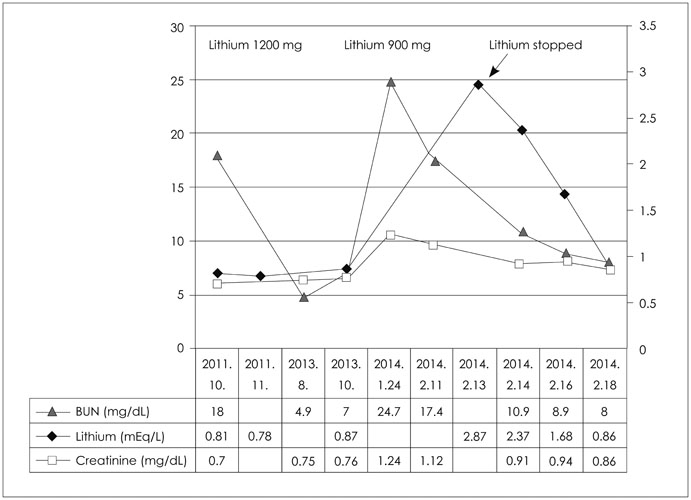J Korean Neuropsychiatr Assoc.
2014 Nov;53(6):434-437. 10.4306/jknpa.2014.53.6.434.
A Case of Lithium Toxicity within Normal Creatinine Range during Lithium Maintenance Treatment
- Affiliations
-
- 1Department of Psychiatry, Sanggye Paik Hospital, Inje University College of Medicine, Seoul, Korea. kimbs328@paik.ac.kr
- 2Department of Internal Medicine, Sanggye Paik Hospital, Inje University College of Medicine, Seoul, Korea.
- KMID: 2383334
- DOI: http://doi.org/10.4306/jknpa.2014.53.6.434
Abstract
- Lithium is a widely used drug for treatment of bipolar disorder. Because of its narrow therapeutic range and renal toxicity, most clinical guidelines recommend regular monitoring of serum lithium level and kidney function for patients taking lithium. We report on a case of a 20 year-old man with occurrence of lithium toxicity after more than one year of lithium maintenance therapy with daily lithium intake of 900 mg. His serum creatinine level was within normal range at admission and elevated compared to his baseline, but still within normal range when lithium toxicity occurred. Acute kidney injury associated with dehydration, analgesics, and nephrotoxic effect of lithium might be a risk factor of lithium toxicity. This case showed the importance of thorough monitoring of serum creatinine level change even if its elevated result is within normal range in observing renal function of patients treated with lithium.
Keyword
MeSH Terms
Figure
Reference
-
1. Tondo L, Baldessarini RJ, Hennen J, Floris G. Lithium maintenance treatment of depression and mania in bipolar I and bipolar II disorders. Am J Psychiatry. 1998; 155:638–645.
Article2. Keck PE Jr, Mendlwicz J, Calabrese JR, Fawcett J, Suppes T, Vestergaard PA, et al. A review of randomized, controlled clinical trials in acute mania. J Affect Disord. 2000; 59:S31–S37.
Article3. Korean College of Neuropsychopharmacology. Clinical neuropsychopharmacology. 2nd ed. Seoul: Sigma Press;2014. p. 164–166.4. Stoudemire A, Moran MG, Fogel BS. Psychotropic drug use in the medically ill: Part I. Psychosomatics. 1990; 31:377–391.5. Timmer RT, Sands JM. Lithium intoxication. J Am Soc Nephrol. 1999; 10:666–674.
Article6. Park SW, Kim JY, Kim SC, Chung IW. A case of lithium toxicity in a patient treated with maintenance dose of lithium. Korean J Psychopharmacol. 2011; 22:157–160.7. Yoon SI, Kim BC, Kwon SK, Kim HY, Kim SK. A case of lithium poisoning with a maintenance dose treated by hemodialysis. Korean J Med. 2007; 72:95–99.8. Okusa MD, Crystal LJ. Clinical manifestations and management of acute lithium intoxication. Am J Med. 1994; 97:383–389.
Article9. Solomon JG. Lithium toxicity precipitated by a diuretic. Psychosomatics. 1980; 21:425. 429.
Article10. Grünfeld JP, Rossier BC. Lithium nephrotoxicity revisited. Nat Rev Nephrol. 2009; 5:270–276.
Article11. Raedler TJ, Wiedemann K. Lithium-induced nephropathies. Psychopharmacol Bull. 2007; 40:134–149.12. Bassilios N, Martel P, Godard V, Froissart M, Grünfeld JP, Stengel B. Réseau Néphropar. Monitoring of glomerular filtration rate in lithium-treated outpatients--an ambulatory laboratory database surveillance. Nephrol Dial Transplant. 2008; 23:562–565.
Article13. American Psychiatric Association. Practice guideline for the treatment of patients with bipolar disorder (revision). Am J Psychiatry. 2002; 159:4 Suppl. 1–50.14. Jefferson JW. A clinician's guide to monitoring kidney function in lithium-treated patients. J Clin Psychiatry. 2010; 71:1153–1157.
Article15. Ng F, Mammen OK, Wilting I, Sachs GS, Ferrier IN, Cassidy F, et al. The International Society for Bipolar Disorders (ISBD) consensus guidelines for the safety monitoring of bipolar disorder treatments. Bipolar Disord. 2009; 11:559–595.
Article16. KDIGO AKI Work Group. KDIGO clinical practice guideline for acute kidney injury. Kidney Int Suppl. 2012; 2:1–138.17. Janowsky DS, Buneviciute J, Hu Q, Davis JM. Lithium-induced renal insufficiency: a longitudinal study of creatinine increases in intellectually disabled adults. J Clin Psychopharmacol. 2011; 31:769–773.18. Tonkin AL, Wing LM. Interactions of non-steroidal anti-inflammatory drugs. Baillieres Clin Rheumatol. 1988; 2:455–483.
Article19. El-Mallakh RS. Treatment of acute lithium toxicity. Vet Hum Toxicol. 1984; 26:31–35.20. Jaeger A, Sauder P, Kopferschmitt J, Tritsch L, Flesch F. When should dialysis be performed in lithium poisoning? A kinetic study in 14 cases of lithium poisoning. J Toxicol Clin Toxicol. 1993; 31:429–447.
Article21. Sadock BJ, Sadock VA. Kaplan & Sadock's Synopsis of Psychiatry. 10th ed. Philadelphia: Lippincott Williams & Wilkins;2007. p. 1056–1062.
- Full Text Links
- Actions
-
Cited
- CITED
-
- Close
- Share
- Similar articles
-
- Lithium Toxicity during Hypertension Treatment Using Angiotensin II Receptor Blocker in a Patient with Bipolar Disorder
- A Case Showing Hyperthyroidism during Long-Term Lithium Carbonate Therapy
- A Case of Lithium Toxicity in a Patient Treated with Maintenance Dose of Lithium
- Renal and hormonal effects of lithium chloride
- Lithium Toxicity Following Vertical Sleeve Gastrectomy: A Case Report


